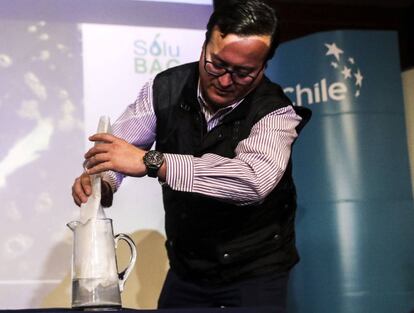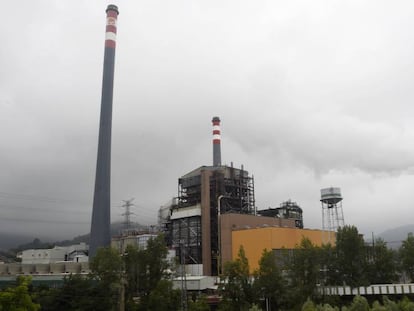Chileans create water-soluble plastic bag that breaks down in minutes
SoluBag, which has no oil derivatives and does not harm the environment, will go on sale in October

Roberto Astete and Cristian Olivares, two researchers from Chile, are the masterminds behind a new biodegradable plastic bag. They discovered the formula while experimenting with biodegradable detergent. The team used PVA, a polyvinyl alcohol that dissolves in water, as their chemical base and then replaced the oil derivatives to ensure the bag would degrade over time.
Traditional plastic remains between 150 and 500 years in the environment and ours only lasts five minutes SoluBag engineer Roberto Astete
It is the oil derivatives in plastic bags that mean they do not break down but instead remain in the environment, causing serious harm to marine life and natural environments.
¡°Our product comes from a limestone that does not hurt the environment,¡± explains Astete, the general director of SoluBag, a company that hopes to start selling the bags in Chile from October.
The Chilean government has launched various initiatives to reduce the use of plastics. From August, it will become one of the first countries in Latin America to ban the use of traditional plastic bags in stores. The idea was first put forward under the former government of president Michelle Bachelet, who proposed a ban on plastic in coastal regions, and it was extended by current President Sebasti¨¢n Pi?era to the whole country.
¡°It¡¯s like making bread,¡± says Astete. ¡°To make bread you need flour and other ingredients. Our flour is polyvinyl alcohol and other elements approved by the FDA [US Food and Drug Administration], that have allowed us to create a prime material to make different products.¡±
Edible bags
With the eyes of the press upon them, Astete and Olivares demonstrate two products: plastic bags that dissolve in cold water and reusable canvas bags that break down in hot water. ¡°What remains in the water is carbon,¡± says Astete, which medical tests show ¡°has no effect on the human body.¡± To prove that what is left behind in warm water is ¡°harmless,¡± he drinks a few glasses of the water.
¡°The main difference between traditional plastic and ours is that traditional plastic remains between 150 and 500 years in the environment and ours only lasts five minutes. You can decide when to destroy it,¡± argues Astete, adding that ¡°today the recycling machine could be your saucepan or washing machine.¡±
Estimates predict that there will be more than 1.2 billion tons of plastic by 2050
The same fabric that dissolves in hot water ¨C which can then be used in a cup of tea or coffee ¨C can be used to make reusable shopping bags or hospital products like mattress protectors, lab coats and doctors¡¯ gloves that are usually discarded after one use, says Olivares.
Another advantage, they add, is that they protect against asphyxia, a cause of childhood accidents in the home. The bags dissolve when they come into contact with a person¡¯s tongue or tears. With mass production planned (existing plastic companies can produce the bags simply by changing their formula), the cost of SoluBags are likely to be similar to current prices, the team claims.
Astete and Olivares are not the first to create biodegradable plastic bags. In 2009, Indonesian biologist Kevin Kumala launched Avani Eco, an eco-friendly company that makes biodegradable and compostable products. Kumala began the project when he returned to his home in Bali, after spending a decade in the United States, and saw the once-pristine beaches strewn with plastic.
In 2014, the world produced 311 million tons of plastic. If annual production continues at this rate, there will be more than 1.2 billion tons of plastic by 2050.
Astete and Olivares hope to give people a way to minimize their damage to the environment by offering a product that can be destroyed when a person chooses ¨C not in 500 years. The project has won an award at this year¡¯s Singularity University Chile Summit, which earned its creators the opportunity to travel to Silicon Valley for an internship at the Silicon Valley-based think tank.
English version by Melissa Kitson.
Tu suscripci¨®n se est¨¢ usando en otro dispositivo
?Quieres a?adir otro usuario a tu suscripci¨®n?
Si contin¨²as leyendo en este dispositivo, no se podr¨¢ leer en el otro.
FlechaTu suscripci¨®n se est¨¢ usando en otro dispositivo y solo puedes acceder a EL PA?S desde un dispositivo a la vez.
Si quieres compartir tu cuenta, cambia tu suscripci¨®n a la modalidad Premium, as¨ª podr¨¢s a?adir otro usuario. Cada uno acceder¨¢ con su propia cuenta de email, lo que os permitir¨¢ personalizar vuestra experiencia en EL PA?S.
En el caso de no saber qui¨¦n est¨¢ usando tu cuenta, te recomendamos cambiar tu contrase?a aqu¨ª.
Si decides continuar compartiendo tu cuenta, este mensaje se mostrar¨¢ en tu dispositivo y en el de la otra persona que est¨¢ usando tu cuenta de forma indefinida, afectando a tu experiencia de lectura. Puedes consultar aqu¨ª los t¨¦rminos y condiciones de la suscripci¨®n digital.










































